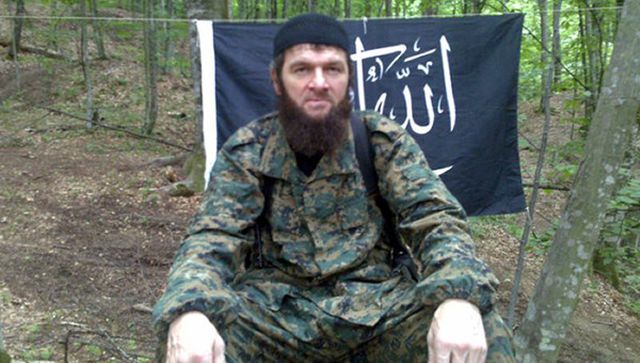
Russia Welcomes US Designation of Umarov as a Terrorist
Publication: Eurasia Daily Monitor Volume: 7 Issue: 123

Russia has welcomed the decision by the United States to designate Chechen rebel leader Doku Umarov, the “Emir” of the so-called Caucasus Emirate, a terrorist. The US move came on June 23 –the eve of Russian President, Dmitry Medvedev’s, summit with US President, Barack Obama, in the White House– when the US State Department issued a statement saying that Umarov had been designated under Presidential Executive Order 13224, which targets terrorists and those providing support to terrorists or acts of terrorism. The State Department said this action “will help stem the flow of financial and other assistance to Umarov.”
The State Department added that Umarov’s emergence as leader of the Chechen insurgency had “intensified the split between national separatists and radical jihadists and led to a movement seeking to create an Islamic Emirate of the Caucasus with Umarov as the Emir.” It noted that Umarov had acknowledged involvement in the 2009 Nevsky Express train derailment which killed 28 people and the 2010 Moscow subway bombings, which killed 40. The State Department quoted its Coordinator for Counterterrorism, Daniel Benjamin, as saying: “The designation of Umarov is in direct response to the threats posed to the United States and Russia. The recent attacks perpetrated by Umarov and his operatives illustrate the global nature of the terrorist problem we face today. We stand in solidarity with the Russian people in our condemnation of these deplorable terrorist acts.”
The State Department concluded by saying that designating Umarov as a terrorist is just “one phase” of the US government’s response to the threat he poses and its effort to “degrade” Umarov’s ability to exert “operational and leadership control” over his group. “We are determined to eliminate the group’s ability to direct violent attacks and to disrupt, dismantle, and defeat Umarov’s network,” the statement concluded (https://www.state.gov/s/ct/rls/other/des/143564.htm).
Russia’s foreign ministry issued a statement yesterday (June 24) –the same day presidents Obama and Medvedev met in the White House– welcoming the US decision to designate Doku Umarov a terrorist. “We consider this step by the American side an important recognition of the indivisibility and common nature of the threat of international terrorism that Russia, the United States and other countries face today,” the Russian foreign ministry statement read, adding, “The decision of the American authorities was the direct result of the anti-terrorist partnership between our countries, which has been strengthening lately, and demonstrated the resolute determination of the leaders of Russia and the United States to work together in the fight against the global challenge of terrorism, which confirmed in full the discussions that took place and the decisions made at the summit in Washington” (https://www.mid.ru/brp_4.nsf/0/48538283522BFDE5C325774C004E34D3).
The Russian president’s representative on terrorism, Anatoly Safonov, called the US State Department’s designation of Umarov as a terrorist “an example of practical cooperation between Russian and the United States in the sphere of anti-terrorism” and “undoubtedly, a plus.” He said the move is also a “signal” to supporters of Umarov abroad that “that if they do not stop it, they are next.” The head of the Memorial human rights group, Oleg Orlov, said the decision was a “correct move” by the United States, although he added that he doubts it will mean much practically, because the US does not have the resources in the North Caucasus to assist in Umarov’s capture (Interfax, June 24).
Meanwhile, two policemen were killed yesterday (June 24) in Dagestan when gunmen opened fire after police stopped their vehicle for an identity check in the village of Karamkhi (Interfax, June 24). Also yesterday, Federal Security Service (FSB) bomb disposal experts defused a powerful improvised explosive device (IED) near the headquarters of the Spiritual Board of Muslims of Dagestan in the republic’s capital, Makhachkala (www.kavkaz-uzel.ru, June 24).
In Chechnya, a police commando died after being critically injured when a landmine detonated as his unit was patrolling wooded area on the outskirts of the village of Shalazhi in the republic’s Urus-Martan district on June 23 (www.kavkaz-uzel.ru, June 24). On June 21, a police officer was slightly wounded when gunmen fired on an interior ministry convoy near the village of Yarysh-Mardy in Chechnya’s Grozny district. That same day, a policeman was wounded in a shootout with suspected militants near the village of Pevomaiskoye in Chechnya’s Vedeno district (Interfax, June 22).
A court bailiff was shot and killed by unidentified attackers in the village of Nesterovskaya in Ingushetia on June 23. On the evening of June 22, unidentified attackers fired a grenade launcher at a police post in Ingushetia’s Nazran district. No one was hurt in that incident. On June 21, gunmen shot at a car in the Nazran district village of Surkhakhi, killing one person and wounding two (www.kavkaz-uzel.ru, June 23).
On June 23, police in Kabardino-Balkaria discovered an “underground laboratory” for making improvised explosive devices in the town of Baksan. In addition to four ready-to-use IED’s and IED components, police found several assault rifles and other firearms (Interfax, June 23). On June 22, police found and defused an IED that had been placed underneath a car in the town of Tyrnyauz in Kabardino-Balkaria. On June 21, a traffic policeman was injured when an IED detonated in the town of Chegem in Kabardino-Balkaria (Interfax, June 22).




